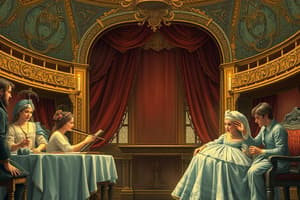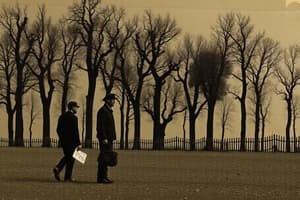Podcast
Questions and Answers
What is a key feature of tragicomedy in the modern context?
What is a key feature of tragicomedy in the modern context?
- It combines elements of both tragedy and comedy. (correct)
- It completely avoids serious themes.
- It is primarily associated with ancient Greek theatre.
- It focuses solely on comedic elements.
Which playwright is mentioned as having a major influence on modern tragicomedy?
Which playwright is mentioned as having a major influence on modern tragicomedy?
- Anton Chekhov (correct)
- Søren Kierkegaard
- Harold Pinter
- William Shakespeare
The term 'comedies of menace' is associated with which playwright?
The term 'comedies of menace' is associated with which playwright?
- Tennessee Williams
- Anton Chekhov
- Harold Pinter (correct)
- David Mamet
Which element is NOT typically found in tragicomedy?
Which element is NOT typically found in tragicomedy?
What influence did philosopher Søren Kierkegaard have on the concept of tragicomedy?
What influence did philosopher Søren Kierkegaard have on the concept of tragicomedy?
In Chekhov's plays, how are the genres of comedy and tragedy often regarded?
In Chekhov's plays, how are the genres of comedy and tragedy often regarded?
What does the term 'farce' refer to in relation to comedy?
What does the term 'farce' refer to in relation to comedy?
Which play by Harold Pinter is recognized as an example of a comedy of menace?
Which play by Harold Pinter is recognized as an example of a comedy of menace?
What does the tragic hero in Aeschylus's play Prometheus Bound claim about facing adversity?
What does the tragic hero in Aeschylus's play Prometheus Bound claim about facing adversity?
According to Aristotle, what emotions does tragedy arouse in its audience?
According to Aristotle, what emotions does tragedy arouse in its audience?
What significant change in the characters of modern tragedies is noted in the content?
What significant change in the characters of modern tragedies is noted in the content?
Which of the following is a significant theme in modern tragedy as described in the content?
Which of the following is a significant theme in modern tragedy as described in the content?
What aspect of traditional tragedy does the concept of 'purgation' refer to?
What aspect of traditional tragedy does the concept of 'purgation' refer to?
What do modern critics argue regarding the status of modern tragedies?
What do modern critics argue regarding the status of modern tragedies?
In The House of Bernarda Alba, what is the primary conflict affecting the daughters?
In The House of Bernarda Alba, what is the primary conflict affecting the daughters?
What does Aristotle believe audiences gain from watching tragedies?
What does Aristotle believe audiences gain from watching tragedies?
What is an example of irrationality in language as discussed in the content?
What is an example of irrationality in language as discussed in the content?
How do absurdist characters typically behave?
How do absurdist characters typically behave?
What characteristic is commonly seen in absurdist plays regarding language?
What characteristic is commonly seen in absurdist plays regarding language?
What is the significance of Bertolt Brecht's 'epic' theatre?
What is the significance of Bertolt Brecht's 'epic' theatre?
What is a notable feature of the dialogues in absurdist theatre?
What is a notable feature of the dialogues in absurdist theatre?
Why do postmodern theorists question categorizing dramas by genre?
Why do postmodern theorists question categorizing dramas by genre?
Which aspect of absurdist plays often confuses the audience?
Which aspect of absurdist plays often confuses the audience?
What do absurdist plays commonly mix in their storytelling?
What do absurdist plays commonly mix in their storytelling?
What significant action does Vanya take at the climax of the scene in Uncle Vanya?
What significant action does Vanya take at the climax of the scene in Uncle Vanya?
What term describes the combination of tragic and comic elements in the theatre of the absurd?
What term describes the combination of tragic and comic elements in the theatre of the absurd?
Which playwright is associated with theatre of the absurd and is known for comedies of menace?
Which playwright is associated with theatre of the absurd and is known for comedies of menace?
What hallmark of the theatre of the absurd highlights the futility of human existence?
What hallmark of the theatre of the absurd highlights the futility of human existence?
In what year was Uncle Vanya first published?
In what year was Uncle Vanya first published?
Which of the following best describes the emotions conveyed in Vanya's action during the confrontation?
Which of the following best describes the emotions conveyed in Vanya's action during the confrontation?
What aspect of the theatre of the absurd does Martin Esslin highlight?
What aspect of the theatre of the absurd does Martin Esslin highlight?
Which of the following is a notable work by Eugene Ionesco associated with the theatre of the absurd?
Which of the following is a notable work by Eugene Ionesco associated with the theatre of the absurd?
What is one reason why certain theatrical forms may be privileged over others?
What is one reason why certain theatrical forms may be privileged over others?
What distinguishes modern tragedy from traditional tragedy according to the content?
What distinguishes modern tragedy from traditional tragedy according to the content?
How have contemporary playwrights approached their craft since the 1960s?
How have contemporary playwrights approached their craft since the 1960s?
What impact does audience differentiation have on theatrical creation?
What impact does audience differentiation have on theatrical creation?
Which form is proposed as an example of a popular theater form?
Which form is proposed as an example of a popular theater form?
What challenge does categorization in drama present according to the discussion?
What challenge does categorization in drama present according to the discussion?
How does the content suggest authors approach formal differentiation in theatre?
How does the content suggest authors approach formal differentiation in theatre?
What does the content imply about the relationship between popular forms and high art?
What does the content imply about the relationship between popular forms and high art?
What does tragedy assume about the universe?
What does tragedy assume about the universe?
Which of the following best describes traditional tragedy's main characters?
Which of the following best describes traditional tragedy's main characters?
How does modern tragedy differ from traditional tragedy in terms of its characters?
How does modern tragedy differ from traditional tragedy in terms of its characters?
What is a defining characteristic of heroic drama?
What is a defining characteristic of heroic drama?
What does bourgeois or domestic drama primarily focus on?
What does bourgeois or domestic drama primarily focus on?
Which statement accurately describes melodrama?
Which statement accurately describes melodrama?
How does comedy treat the natural laws of the world?
How does comedy treat the natural laws of the world?
Which technique is NOT typically used in comedy?
Which technique is NOT typically used in comedy?
Flashcards
Tragic Hero
Tragic Hero
A character who meets their fate with dignity and determination.
Aeschylus's Prometheus
Aeschylus's Prometheus
An early tragic hero who defies the tempest without trembling.
Aristotle's Tragedy
Aristotle's Tragedy
Genre that evokes pity and fear, leading to emotional purgation.
Purgation
Purgation
Signup and view all the flashcards
Modern Tragedy
Modern Tragedy
Signup and view all the flashcards
Philosophical Tragedies
Philosophical Tragedies
Signup and view all the flashcards
The House of Bernarda Alba
The House of Bernarda Alba
Signup and view all the flashcards
Themes of Dignity
Themes of Dignity
Signup and view all the flashcards
Tragicomedy
Tragicomedy
Signup and view all the flashcards
Modern Tragicomedy
Modern Tragicomedy
Signup and view all the flashcards
Søren Kierkegaard
Søren Kierkegaard
Signup and view all the flashcards
Anton Chekhov
Anton Chekhov
Signup and view all the flashcards
Comedies of Menace
Comedies of Menace
Signup and view all the flashcards
Harold Pinter
Harold Pinter
Signup and view all the flashcards
All’s Well That Ends Well
All’s Well That Ends Well
Signup and view all the flashcards
Existential Striving
Existential Striving
Signup and view all the flashcards
Uncle Vanya
Uncle Vanya
Signup and view all the flashcards
Theatre of the Absurd
Theatre of the Absurd
Signup and view all the flashcards
Eugene Ionesco
Eugene Ionesco
Signup and view all the flashcards
Existential Characters
Existential Characters
Signup and view all the flashcards
Non sequitur
Non sequitur
Signup and view all the flashcards
Ridiculous Situations
Ridiculous Situations
Signup and view all the flashcards
Absurdist Language
Absurdist Language
Signup and view all the flashcards
Lucky's Speech
Lucky's Speech
Signup and view all the flashcards
Epic Theatre
Epic Theatre
Signup and view all the flashcards
Postmodernism in Theatre
Postmodernism in Theatre
Signup and view all the flashcards
Mixing Genres
Mixing Genres
Signup and view all the flashcards
Puncher and Wattmann
Puncher and Wattmann
Signup and view all the flashcards
Tragedy
Tragedy
Signup and view all the flashcards
Traditional Tragedy
Traditional Tragedy
Signup and view all the flashcards
Heroic Drama
Heroic Drama
Signup and view all the flashcards
Bourgeois Drama
Bourgeois Drama
Signup and view all the flashcards
Melodrama
Melodrama
Signup and view all the flashcards
Comedy
Comedy
Signup and view all the flashcards
Comic Techniques
Comic Techniques
Signup and view all the flashcards
Hierarchy in Theatre
Hierarchy in Theatre
Signup and view all the flashcards
Documentary Plays
Documentary Plays
Signup and view all the flashcards
Experimental Theatre
Experimental Theatre
Signup and view all the flashcards
Popular vs. High Art
Popular vs. High Art
Signup and view all the flashcards
Musical Theatre
Musical Theatre
Signup and view all the flashcards
Subcategories of Theatre
Subcategories of Theatre
Signup and view all the flashcards
Audience Engagement
Audience Engagement
Signup and view all the flashcards
Sociopolitical Implications
Sociopolitical Implications
Signup and view all the flashcards
Study Notes
Theatrical Genres
- Theatrical performances communicate a tone and mood within the first fifteen minutes.
- Playwrights, actors, and directors influence the audience's perception.
- Genres are categories of drama, like tragedy and comedy.
- Greek theatre (5th century BCE) used masks to symbolize tragedy and comedy.
- Nō (14th century CE, Japan) was a serious form of drama.
- Kyōgen (14th century CE, Japan) was a comical form of drama.
- Genre, in French, means type or category.
- Tragedy, comedy, farce, melodrama, tragicomedy, and other genres exist.
- Comedy is a humorous form of drama that aims to entertain.
Types of Drama
- Tragedy is a serious form of drama that explores human suffering, frequently focusing on the downfall of a protagonist.
- Tragedy often explores basic questions about human existence–fate, suffering, and the struggle against what is often insurmountable forces.
- Tragic heroes and heroines are usually figures of high stature-kings, queens, generals, or nobles.
- Tragic circumstances generally include situations a character cannot escape, leading to a tragic fall.
- Tragic irony is often present in tragedy.
- Comedy can have various forms-verbal wit, plot complications, or character eccentricities.
- Comedy is generally optimistic, dealing with lighter subjects and resolutions.
- Comedy of manners involves the upper class in society.
- Comedy of ideas deals with intellectual propositions or philosophical ideas through humour.
Modern Domestic Drama
- Mid-20th century, American playwrights focused on domestic drama.
- Plays explore problems of families and relationships--parents and children, husbands and wives, and growing up and growing old.
- These problems often involve relationships between people with social tensions and conflicts.
Melodrama
- Popular drama form in 18th and 19th centuries.
- Melodrama draws on music and spectacle to create emotions.
- Melodrama emphasizes conflict between good and evil, with clear and stereotypical characters.
- Melodrama often uses plot devices like suspense, danger, and close brushes with disaster.
Farce
- A form of comedy using exaggeration, absurd situations, and plot complications.
Studying That Suits You
Use AI to generate personalized quizzes and flashcards to suit your learning preferences.




